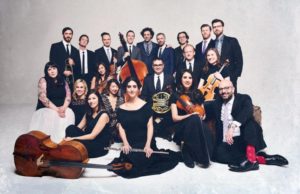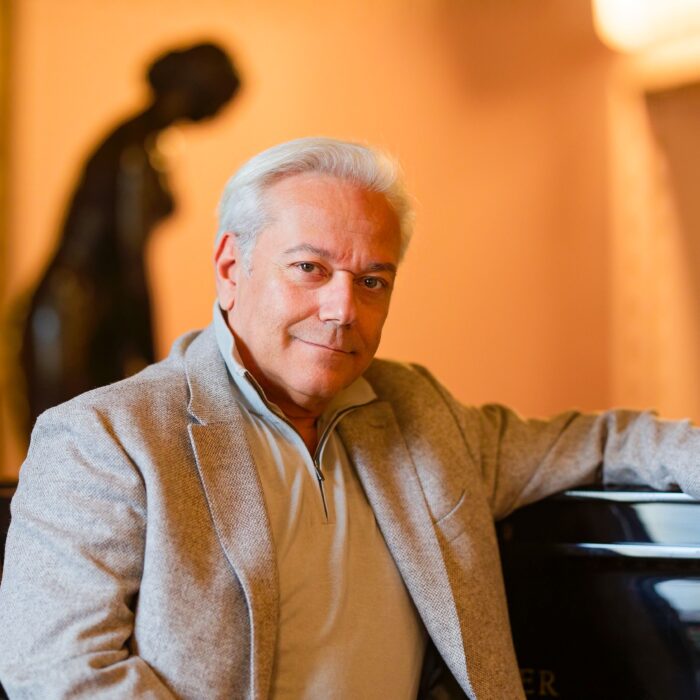
Q & A: The Knights’ Co-Founder Colin Jacobsen On ‘Candide,’ Growth & Future Projects
By Greg MoomjyFor any fans who still believe classical music is confined to opulent concert halls, only to be enjoyed by the pillars of society, meet The Knights.
Founded by brothers Colin and Eric Jacobsen, this adventurous 40-member chamber orchestra performs everything from Beethoven to Jimi Hendrix. Born into a musical family, with a father who played in the Metropolitan Opera Orchestra, the Jacobsens were inspired by music’s ability to connect people. That quest for connection across genre is the mission of the orchestra and why its members call themselves “knights”.
OperaWire recently interviewed The Knights’ Colin Jacobsen as they prepared for a performance of “Candide” at the Ravinia festival. They discussed everything from their Brooklyn roots, to their recording catalogue, to the relationship between music and politics.
OperaWire: Is there anything about coming from Brooklyn that has informed the mission/spirit of The Knights?
Colin Jacobsen: Brooklyn is a such vibrant place culturally, so it is only natural that that would affect some of our ideas about programming, working across cultures, and breaking down barriers between audience and performer.
There are many examples, but one that sticks in my mind is a concert where we worked with the composer/steel pan performer Andy Akiho and the Pan Evolution Steel Orchestra based out of Brooklyn. Two really different musical cultures coming together to create new sounds, stories and bring people together at BRIC, which has been our home base for the last few years.
OW: How have The Knights evolved over time?
CJ: We started a bit like the classical music version of a garage band (substitute living room). We were at first friends who got together sheerly for the joy of working intensely on and playing music together. Eric and myself did all administration work at first, with help from a few of the other musicians. There was such a good energy around those early concerts that we decided at some point to put more energy into making it a sustainable, viable living orchestra. That involved transition from a DIY mentality to building an organization with a board, staff and a defined musician membership.
The mixture of dedicated, searching artistic spirit with a sense of humor still permeates our rehearsal process and concerts. We believe that a concert should be an organic development of that rehearsal process rather than a pre-packaged event. If we lose those qualities, The Knights would be a different beast, and we’d question its value to the world. But at this moment, we love the people, the music, the people, the music, the people, the music, the people, the music, etc.
OW: You’ve worked with several prominent artists, many of whom, like YoYo Ma share your mission of bringing music to the masses and showing classical music in a new light. What’s it like to work with these like-minded individuals?
CJ: We are always looking for artists to collaborate with who will inspire us, challenge us and indeed who share a certain open-minded approach to music and its place in the world. Who cherish and come from deeply rooted traditions but who also drive those traditions forward.
We stumbled across this quote from Gustav Mahler recently, who said something like, “Tradition isn’t the worship of ashes, but the preservation of fire.” You mention Yo-Yo, who indeed has been a friend and mentor to Eric, myself and the group for years. Azul, which is the album we made with him (title track/concerto by Osvaldo Golijov) encapsulates the way Yo-Yo and others have inspired us. It is based on the idea that humanity has always looked up at the stars and experienced a sense of wonder, but since the Apollo missions has been able to achieve a completely new perspective: to look back down at our home planet Earth as a totality rather than the artificial lines we’ve drawn on maps. (see “The Overview Effect” that astronauts experience).
I mention this because Yo-Yo has taught us how to carefully consider every detail in a piece of music, but that those details always need to be in service of a broad vision for a piece of music, and to look at that piece of music from many different angles. And then it’s important to keep in mind how that piece of music, or that particular performance or album fits into the larger world. Overwhelming- and hard to live up to all the time, but there’s a sense of cosmic harmony when we are able to achieve that state of mind…
OW: What’s your process of creating a program?
CJ: Eric and I are constantly bandying about ideas as we go, sometimes in the abstract; (ie “wouldn’t that be cool…”) sometimes responding to a particular situation; (eg do we want to work with that artist- if so, what are they proposing to do and what would we want to create alongside it to create a cohesive program) sometimes 3 years ahead of time, and sometimes for things that come up in a month or less.
We have a programming committee in The Knights that also advises and helps create concepts and ideas. There are so many factors that go into programming- it is a dizzying thing, and also feels like we are jugglers of time because of the different time-horizons I mentioned. (And then there are of course practical concerns like venue size, group size, budget, etc.) We love the idea of surprise, of juxtaposition between elements. Or we love a single-minded focus on one idea. I guess I would call what we do very eclectic, yet carefully curated.
OW: You’ve performed music by a wide range of composers, what’s it like performing a newer work versus a traditional piece? What other pieces would you like to record?
CJ: Second of Silence is one of our favorite albums for that mix of old and new, of seemingly strange bedfellows Schubert, Glass, Feldman and Satie. There were several threads that brought them together for us. One was Beckett and his love of Schubert, his work with Morton Feldman, and Philip Glass’ music for a Beckett play… There’s so much music out there in the world that we’d love to record.
We actually just were in the studio recording Beethoven and Brahms Concerti with Gil Shaham during this project with him at Tanglewood and Ravinia. It was great to delve deeply into those iconic works with one of the great soloists of our time. There are a lot of new pieces that we’d love to record that have been written for the group or played by the group recently, including a flute concerto by Judd Greenstein, a piece by Lisa Bielawa called Fictional Migrations, a work by Nico Muhly for strings and tenor called Impossible Things (which we gave the NY premiere with Nicholas Phan), a Concertino Grosso by clarinetist/composer Kinan Azmeh and an upcoming piece by Gabriel Kahane.
We also would love to record and showcase some of the original works and arrangements by members of the group which have been created over the last few years and run the gamut stylistically because of the many and varied talents of Knights members.
But in the meantime, on September 27th look for a beautiful new album called “My Outstretched Hand” which we made with the San Francisco Girls Chorus and which features works by Aaron Jay Kernis, Lisa Bielawa and myself (Colin Jacobsen).
OW: What other artists would you like to work with?
CJ: The world’s a big place- and I’ve love to start at home and keep finding interesting artists who might not be household names/are in that interesting place of just finding their voices. Then there are the people that we’ve started relationships with but would love to see those relationships continue or grow. (ie Yuja Wang, Joyce Di Donato, William Kentridge, Pekka Kuusisto) And dreaming out loud of some others: Peter Sellars, Esperanza Spalding, Bjork, Bill Murray, Jon Batiste, Emanuel Ax, Barbara Hannigan are a few.
OW: From the beginnings of its history, “Candide” has satirized current society and politics. How do you think Candide’s satire reflects modern times?
CJ: The value of satire to pierce hypocrisy has always been relevant, but in today’s world seems all the more important. When truth is under attack from all sides, disinformation rampant, satire has the ability to whisk away the curtain and open people’s eyes to what is really going on. Perhaps one of the most relevant takeaways from “Candide” is the skewering right and left of false piety (whether in a religious or social context), which is rampant across the political spectrum- and false piety leads to a humorless society, which plays into the hands of authoritarianism (as well documented historically).
OW: What is unique about performing at the Ravinia Festival?
CJ: I love that Ravinia’s roots were as an amusement park (its decor still has faint hints in the lighting and physical landscape that make me think of those roots). These aesthetics play perfectly into the design of our “Candide” production, which has hints of circus. The combination of play, humor and serious music are things we treasure in The Knights and also seem to give summer festivals like Ravinia their special spirit.


